At the Aspen Institute Economic Opportunities Program, and for our many colleagues and partners, the ongoing and intertwined health, economic, and racial justice crises bring new urgency to our work to improve access to quality jobs, options to participate in business ownership, and the freedom to pursue economic opportunity. Below we share our monthly newsletter with highlights of recent work. As always, we welcome your feedback, thoughts, and partnership in advancing inclusive opportunity and an economy in which we all can thrive. Click here to subscribe.
Click here to view past editions of our newsletter.
Upcoming Events
EOP will continue to host virtual events and webinars this season. Join our mailing list and follow us on social media to learn when new opportunities are available.
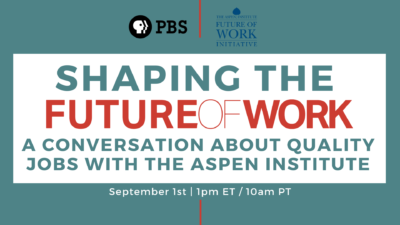
Sept 1: Shaping the Future of Work: A Conversation About Quality Jobs
Join us on Wednesday, September 1, from 1:00pm – 2:00pm EDT for “Shaping the Future of Work: A Conversation About Quality Jobs.” Presented in partnership between PBS and the Future of Work Initiative, this conversation seeks to explore how we can ensure that the jobs we add back to our recovering economy are high-quality jobs providing a ladder to success for more workers. Speakers include Nafisah Ula, organizing director of Jobs with Justice; Rachel Korberg, executive director and co-founder of the Families and Workers Fund; Rick Plympton, CEO of Optimax and Job Quality Fellow of the Aspen Institute; and Alex Camardelle, director of the Workforce Policy Program at the Joint Center for Political & Economic Studies. Register here to join us.
Add your voice to the conversation: ask a question here about your future in the workplace.
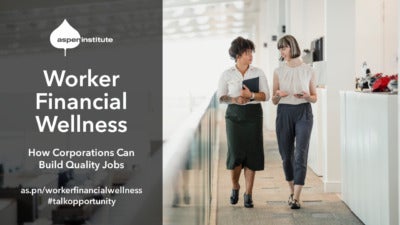
Sept 15: Worker Financial Wellness: How Corporations Can Build Quality Jobs
On Wednesday September 15th, from 1:00pm – 2:00pm EDT, our Opportunity in America discussion series continues with “Worker Financial Wellness: How Corporations Can Build Quality Jobs.” As the US economy emerges from COVID-19, business leaders are considering solutions to shape an equitable and inclusive recovery and take action for racial equity. One path: making worker financial wellness a corporate priority. Research shows that improving workers’ financial wellness benefits not only workers themselves, but also business outcomes such as productivity, innovation, customer satisfaction, and employee turnover and engagement. This event will focus on what companies can accomplish when they pursue improving the financial health and resilience of workers. Register here to join us.

Sept 22: Insights from Businesses: How Digital Transformation Is Impacting Work and Skill Needs
This summer, we’ve been speaking with employers to learn how businesses are adopting technology in the workplace, how digital transformation is impacting skill needs for frontline workers, and what approaches businesses are taking to support development of digital skills for frontline workers. Join us on September 22 from 2:00pm – 3:30pm ET for a virtual event where we’ll look at what we have learned from employers and what can and should be done to help workers build the skills they need to advance in the workplace. This is the third part of a year-long study looking at how COVID-19 and heightened attention to racial inequality are affecting businesses’ operations, skill needs, hiring and HR practices, and education and training programs. Click here to register.

Sept 29: Promoting Equity and Inclusion for Young Workers
On September 29, EOP Research Director Amy Blair will partner with Sam DeCarlo, director of workforce development at Our Piece of the Pie, at a virtual learning event convened by the Aspen Institute Forum for Community Solutions/Opportunity Youth Forum. They will explore practices that youth and young adult-serving workforce organizations use to influence employer practice change to promote equity and inclusion. Practical examples of the work of OPP and other organizations are highlighted in EOP’s recent Generation Work report Promoting Equity and Inclusion and Connection to Good Fit Jobs for Young Adults. Click here for more information about the Opportunity Youth Forum conference.
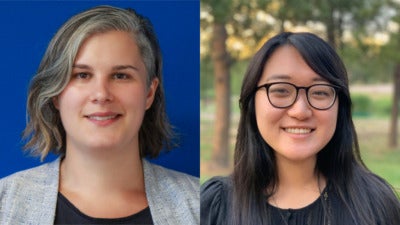
Sept 30: Good Jobs Good Business Tools: How Employee-Focused Employers Can Drive Better Business Results
On September 30, the Colorado Department of Labor and Employment will host a webinar entitled, “Good Jobs Good Business Tools: How Employee-Focused Employers Can Drive Better Business Results.” Workforce Strategies Initiative Associate Director Jenny Weissbourd and Research Associate Yoorie Chang, along with our partners Tom Woelfel and Sanjana Seth from Pacific Community Ventures, will discuss tools and techniques aimed at small businesses for improving job quality and driving business performance. The presentation will feature our Job Quality Tools Library and PCV’s Good Jobs Good Business Toolkit.
News and Updates
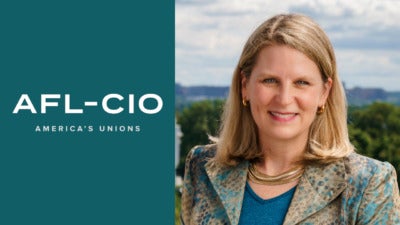
Economic Opportunities Program Congratulates Liz Shuler and AFL-CIO on Her Election as President
The Aspen Institute Economic Opportunities Program extends our heartiest congratulations to Liz Shuler and our AFL-CIO colleagues on her recent election as president. At EOP we have had the privilege of having Liz as an advisor and friend and have seen her commitment to job quality, racial and gender equity, and economic justice. Liz is well-equipped to carry on and expand the visionary agenda of the late Richard Trumka, and brings a clear-eyed vision for the future to her important work of building better futures for working people, their families, and communities. We have the highest confidence in her leadership and look forward to continued partnership as she works to advance progress for workers, the economy, and society. For more information, note the announcement of election for the new leadership team from the AFL-CIO.
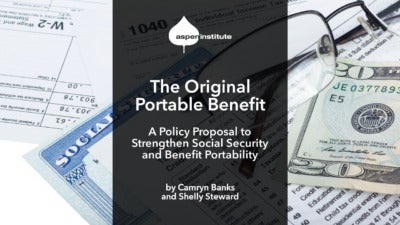
The Original Portable Benefit: A Policy Proposal to Strengthen Social Security and Benefit Portability
On August 13, Future of Work Initiative Research and Policy Intern Camryn Banks and Director Shelly Steward published “The Original Portable Benefit: A Policy Proposal to Strengthen Social Security and Benefit Portability.” Millions of American workers rely on social policy to sustain them during challenging times, and social safety net programs allow people to participate more fully in their lives and the economy despite financial uncertainty. Social Security is one of the foundational programs of the social safety net, and presents a model of exactly the type of benefit workers need in the 21st century—portable across jobs and available to all workers. Yet, Shifting demographics combined with little policy change has pushed this program into crisis, with reserves predicted to be depleted as early as 2035 without intervention. Read more about actionable solutions to the current crisis via their proposal here.
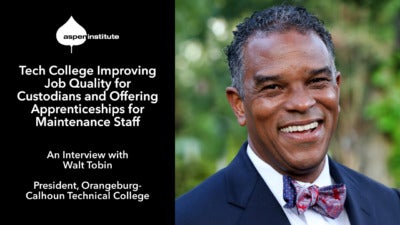
Tech College Improving Job Quality for Custodians and Offering Apprenticeships for Maintenance Staff
This month, EOP Executive Director Maureen Conway sat down for a conversation with Walt Tobin, an Aspen Institute Job Quality Fellow and president of Orangeburg-Calhoun Technical College. They discussed the college’s efforts to boost job quality and opportunities, particularly for frontline employees, as OCtech largely focuses on equipping students for careers in advanced manufacturing and health care. “We as higher ed institutions need to set the example,” said Tobin. “I was going out telling businesses that they needed to start apprenticeships, and when I looked internally, I didn’t have one at my own organization.” Read more via our blog post here.
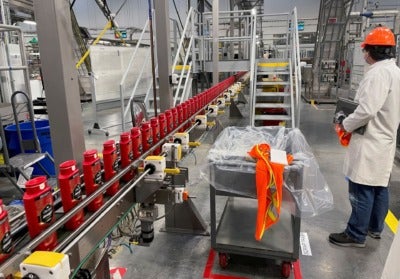
Source: The Washington Post
Don’t Blame Workers for a Shortage of Good Jobs
The combined crises of the pandemic and extraordinary economic slump over the past 18 months yielded increased attention to labor market conditions. A story line emerged lately in the news about a labor shortage that is due to workers choosing not to work. This is a misleading and damaging narrative. Working people didn’t choose to lose their jobs as the pandemic hit. And in recovery, many have very good reasons (no childcare, health concerns, transportation issues, poor wages/working conditions, etc.) for not returning to a job that didn’t pay them enough to live on in the first place. It’s simply not right to blame workers because some businesses are now having a hard time filling food service and hospitality jobs. In response to a recent Washington Post article, EOP Executive Director Maureen Conway and Good Companies Good Jobs Initiative Director Mark Popovich penned a letter to the editor, which can be found here.

Source: Talent Rewire
Advancing Frontline Employee Voice: Knowledge is Power
In Talent Rewire, an employer network dedicated to advancing opportunity employment, Emily Hanning writes about a recent conversation they hosted with EOP and one of our Reimagine Retail small business partners, Well Crafted Kitchen. Workforce Strategies Initiative Associate Director Jenny Weissbourd and Research Associate Yoorie Chang talked about how to advance worker voice. “Listening to workers is a key source of innovation for companies – and it improves engagement, retention, and productivity,” notes Weissbourd. Check out the full article here.
EOP Welcomes New Staff
We are delighted to welcome our newest team members, Senior Research Associates Mohona Siddique and Amanda Fins! We are excited to have them on board and look forward to their future with us.

Mohona Siddique
Mohona Siddique is a senior research associate at EOP and joined the program in August 2021. Her work focuses on economic mobility and job quality for low- and moderate-income workers and encompasses topics within workforce strategies and the future of work.
Mohona is an urban planner with a background in policy and strategic planning in the public and nonprofit sectors. Prior to joining the Aspen Institute, Mohona was the executive policy specialist for the Commonwealth of Pennsylvania Department of Labor and Industry, where she oversaw policy initiatives related to the future of work and workforce. She has held roles at the Economy League of Greater Philadelphia, where she managed the civic consulting practice, spearheading research and consulting projects related to workforce and economic development. Mohona holds a bachelor’s degree from Wellesley College and a Master’s in City Planning from the University of Pennsylvania. She lives with her husband in Central Pennsylvania.

Amanda Fins
Amanda Fins is a senior research associate with EOP. Her work includes the planning, management, and implementation of a variety of research and evaluation projects across EOP, with a primary focus on the Workforce Strategies Initiative.
Prior to coming to the Aspen Institute, Amanda completed a research fellowship at the National Women’s Law Center, where she worked on both quantitative and qualitative research projects to measure the impact of a wide range of barriers on women and their families’ well-being. Especially focused on the experience of women facing multiple forms of oppression, some of her areas of work included the impact of COVID-19 on women working in essential jobs, equal pay, the benefit of unionization for women, and the experience of girls and LGBTQ+ youth of color in schools. Amanda holds a master’s degree in public policy with a concentration in social policy from The George Washington University. During her time as a graduate student, she completed a research internship at EOP as well as a graduate assistantship with the GW Institute of Public Policy.
Amanda holds her Bachelor of Arts in English Literature from Montclair State University, from her home state of New Jersey. Outside of work, she is an avid reader, bad TV enthusiast, and likes to spend time outdoors – playing tennis, frequenting the local farmers market, and getting out of the city as often as possible.
Join the conversation
Follow EOP on social media to join the conversation!
-Workforce Strategies Initiative @AspenWorkforce
-Business Ownership Initiative @Aspen_BOI
-UpSkill America @upskillamerica
-Future of Work Initiative @AspenFutureWork
About EOP
The Aspen Institute Economic Opportunities Program (EOP) advances strategies, policies, and ideas to help low- and moderate-income people thrive in a changing economy. We recognize that race, gender, and place intersect with and intensify the challenge of economic inequality and we address these dynamics by advancing an inclusive vision of economic justice. For over 25 years, EOP has focused on expanding individuals’ opportunities to connect to quality work, start businesses, and build economic stability that provides the freedom to pursue opportunity. For more information, visit as.pn/eop.
EOP has several initiatives, including the Business Ownership Initiative, Workforce Strategies Initiative, UpSkill America, Good Companies/Good Jobs, and the Future of Work Initiative. In addition, across these approaches EOP hosts the Economic Opportunity Fellows Network and the Opportunity in America event series.
Thank you to our many partners and funders for supporting our efforts.
Support Our Work
We are committed to making our events and publications freely available to everyone who finds them useful. But if you find value in our work and are able to support it, please consider making a tax-deductible donation. Click here to learn more.
Keep in Touch
Click here to join our mailing list. For updates every day, follow us on social media.

